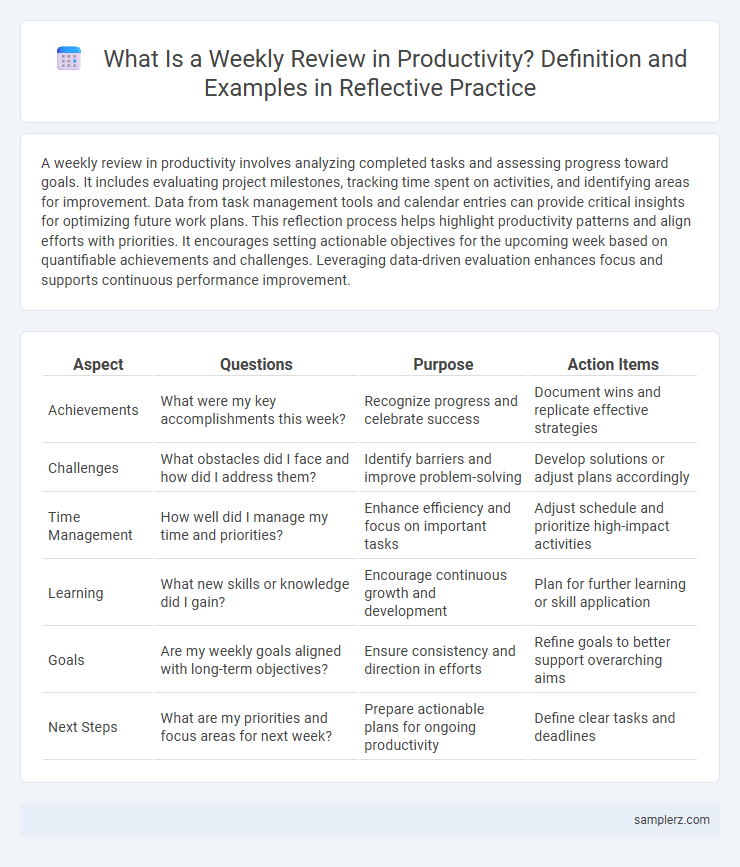A weekly review in productivity involves analyzing completed tasks and assessing progress toward goals. It includes evaluating project milestones, tracking time spent on activities, and identifying areas for improvement. Data from task management tools and calendar entries can provide critical insights for optimizing future work plans. This reflection process helps highlight productivity patterns and align efforts with priorities. It encourages setting actionable objectives for the upcoming week based on quantifiable achievements and challenges. Leveraging data-driven evaluation enhances focus and supports continuous performance improvement.
Table of Comparison
| Aspect | Questions | Purpose | Action Items |
|---|---|---|---|
| Achievements | What were my key accomplishments this week? | Recognize progress and celebrate success | Document wins and replicate effective strategies |
| Challenges | What obstacles did I face and how did I address them? | Identify barriers and improve problem-solving | Develop solutions or adjust plans accordingly |
| Time Management | How well did I manage my time and priorities? | Enhance efficiency and focus on important tasks | Adjust schedule and prioritize high-impact activities |
| Learning | What new skills or knowledge did I gain? | Encourage continuous growth and development | Plan for further learning or skill application |
| Goals | Are my weekly goals aligned with long-term objectives? | Ensure consistency and direction in efforts | Refine goals to better support overarching aims |
| Next Steps | What are my priorities and focus areas for next week? | Prepare actionable plans for ongoing productivity | Define clear tasks and deadlines |
Understanding the Purpose of a Weekly Review
A weekly review involves systematically examining completed tasks, ongoing projects, and upcoming priorities to align actions with long-term goals. This process enhances self-awareness by identifying productivity patterns and bottlenecks, allowing for strategic adjustments. Understanding the purpose of a weekly review ensures consistent progress, reduces stress, and maintains clarity in prioritizing meaningful work.
Key Benefits of Implementing Weekly Reflections
Weekly reflections enhance productivity by identifying completed tasks and recognizing areas for improvement, enabling better time management and goal alignment. This practice fosters continuous learning, reduces procrastination, and increases accountability by regularly assessing progress against objectives. Implementing weekly reviews also improves focus by prioritizing high-impact activities and minimizing distractions in upcoming workweeks.
Setting Up Your Weekly Review Environment
Organize your workspace by clearing distractions and gathering essential tools such as planner, notes, and digital devices for an efficient weekly review. Create a quiet environment with minimal interruptions to enhance concentration and reflection on past tasks. Schedule a consistent time each week for this review to build a reliable routine that supports productivity and goal tracking.
Essential Questions for a Productive Weekly Review
A productive weekly review centers around essential questions such as "What were my biggest achievements this week?" and "Which tasks contributed most to my long-term goals?" Reflecting on obstacles encountered and evaluating priority alignment ensures continuous progress and clarity for the upcoming week. This structured evaluation enhances time management, boosts motivation, and sharpens focus on high-impact activities.
Step-by-Step Weekly Review Workflow Example
A step-by-step weekly review workflow example includes collecting all loose papers, notes, and tasks to ensure no item is overlooked, followed by reviewing calendars and email inboxes for any unfinished or upcoming commitments. Next, assess project statuses and update task lists to reflect current priorities and deadlines, emphasizing important deadlines and progress updates. Finally, plan actionable steps for the upcoming week, setting clear goals to enhance productivity and maintain focus.
Categorizing Reflection Areas: Work, Personal, and Learning
Weekly reviews enhance productivity by categorizing reflection areas into Work, Personal, and Learning, allowing clear prioritization of tasks and goals. Assessing completed projects, upcoming deadlines, and skill development needs in these categories ensures balanced progress across professional responsibilities, personal well-being, and continuous education. This structured approach enables timely adjustments and focused decision-making to optimize overall productivity.
Using Tools and Templates for Efficient Reviews
Utilizing specialized tools like digital planners and customizable templates streamlines the weekly-review process, ensuring consistency and comprehensive reflection. Templates that prompt goal assessment, task prioritization, and time tracking optimize focus and help identify productivity bottlenecks. Integrating these tools enables efficient review sessions that enhance decision-making and task management for the upcoming week.
Common Challenges and How to Overcome Them
Weekly reviews often reveal common productivity challenges such as task backlog accumulation, unclear priorities, and time mismanagement. To overcome these issues, implementing a structured review process with prioritized task lists, time-blocking techniques, and clear goal setting improves focus and progress tracking. Consistent reflection during weekly reviews enhances self-awareness, enabling adjustments that prevent future productivity pitfalls.
Integrating Weekly Insights into Future Planning
Weekly reviews enhance productivity by consolidating insights from completed tasks and identifying patterns in time management and goal achievement. Highlighting successes and challenges allows for redefined priorities and adjustment of upcoming goals to align with long-term objectives. Integrating these reflections into future planning creates a dynamic roadmap that fosters continuous improvement and focused progress.
Tracking Progress: Measuring the Impact of Weekly Reviews
Weekly reviews serve as a powerful tool for tracking progress by systematically measuring completed tasks against set goals, enabling clear identification of productivity trends over time. Consistent reflection during these reviews highlights areas of improvement and facilitates adjustments in focus, enhancing overall efficiency. Data-driven insights gathered from weekly assessments foster a results-oriented mindset and support continuous personal and professional development.

example of weekly-review in reflection Infographic
 samplerz.com
samplerz.com